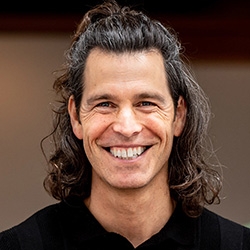

Search Results: challenge
-
To help you stay connected to yourself and the other person when in challenging discussions about COVID-19 vaccines or other hot issues, without labeling others as reactive or otherwise, you can begin by tracking signs of your own reactivity to bring mindfulness onboard, then shifting your attention to universal needs; and asking to connect about it later. Read on for more.
-
It may be challenging to hear or make requests when you feel shame regarding anyone's feelings and needs. Without support, shame could be debilitating, so you may feel resistant and become defensive, hear threat, or criticize others. Instead, be with people who allow space for vulnerability. Find ways to celebrate, negotiate, be mindful, accepting, and creative.
-
Shifting to a needs-based perspective is one of the most powerful—and challenging—aspects of integrating Nonviolent Communication (NVC) into daily life. In this short video, Mary Mackenzie offers three simple, practical tips to help you cultivate needs consciousness and transform how you experience your world and relationships.
-
- Discover what is yours to do in response to our global crises
- Weave nonviolence more deeply into how you live and lead
- Receive ongoing support in how to be effective and alive while pursuing your highest goals
- Increase your capacity to face and mourn current reality as a source of greater choice and energy
- Be a part of transforming the legacy of scarcity, separation, and powerlessness into a livable future
-
-
In a workshop, a hesitant white neurodivergent man faced a triggering reaction from a Global Majority transgender man. Uncovering their backgrounds, the facilitator addressed family dynamics and exclusion. A repair exercise fostered empathy, challenging assumptions and emphasizing the importance of equitable facilitation for a richer group experience.
-
Join CNVC Certified Trainer Mary Mackenzie to learn a few of her tried-and-true simple Self-Empathy techniques, especially focused on the challenges of the holiday season.
-
Many families are far more complex and varied than they used to be. In this recording, Miki works with participants, focusing on specific challenges they’re facing with family members. Listen In.
-
Listen to Mary tackle one of the greatest challenges of facilitating an NVC group: How do you deal with hecklers and people you don't like? Mary offers insightful tips and helpful guidance.
-
Bring NVC beyond personal growth, explore perspectives that transform how we respond to crisis.
-
Explore how social systems shape personal experience, and how nonviolence can support healing.
-
Fear and self-doubt often hold us back from taking action, but Roxy Manning urges us to confront these barriers, prepare for challenges, and build strong support systems. Social change is tough, and frustration is inevitable, but by embracing our humanity and staying committed, we can create meaningful impact. The key is to step in with courage, empathy, and a plan to sustain the journey.
-
Fear and self-doubt often hold us back from taking action, but Roxy Manning urges us to confront these barriers, prepare for challenges, and build strong support systems. Social change is tough, and frustration is inevitable, but by embracing our humanity and staying committed, we can create meaningful impact. The key is to step in with courage, empathy, and a plan to sustain the journey.
-
Giving feedback across a differences in culture, race, and power isn't something that we have to do -- but we can choose to do it for our own liberation, if we want. And if we choose that path, impact delivered well can invite caring for all needs and increase capacity to learn. This is the exacting, rigorous work of speaking about impact without attributing anything to the person whose actions resulted in the impact. Read on for part 1 of 2.
-
Why is it so difficult to change our patterns even when we want to, even when we experience shame or despair about them? Arnina Kashtan offers some of the common pitfalls and concrete steps to overcome them in the future.
-
We each hold an internal model or set of expectations about how caring and comfort could be accessed in relationship. The ability to reflect upon and challenge our own dominant model of perceptions, beliefs, and behaviors --and to experience discomfort and vulnerability-- is a key feature of "security". If not, an "attachment reactivity" arises -- where sense of insecurity, separateness, and belief that love, and acceptance can't be trusted nor accessed reliably. Thus change would require intensive support. Here's a guide to help you reflect and access change.
-
What can we do to bring vitality and resourcefulness back into our lives when we are feeling overwhelmed, depressed, anxious, or frustrated? Read on for a nine step process.
-
- Learn how every decision we make perpetuates the status quo or brings us closer to the vision of a world that works for all
- Find out about our big brain capacity to integrate needs, impacts, and resources to make decisions that work for everyone
- Understand why power differences interfere with collaborative decisions and what can be done about it
- Discover tools that support collaboration in larger groups and organizations— even across power differences!
-
- Discover how to figure out what you really want, then how to ask for it
- Learn how to make requests with ease and how to guess the requests of others
- Practice strategies for turning ‘demand energy’ into ‘request energy’
- Be able to stand firmly for your needs and assertively ask for what you want
-
When a person of color (A.K.A. a person from the Global Majority, or GM) tells a marginalization story that triggers a defensive response from a white participant in a group, to foster awareness and healing, leaders can address the white person's distress with empathy, highlighting the common dynamic of prioritizing white pain. From there, leaders can offer GM participants opportunity to share their experience and make requests of the group.
Quick Links

Stay in Touch!
We value your privacy, won't share your email address and you can easily unsubscribe any time.

















